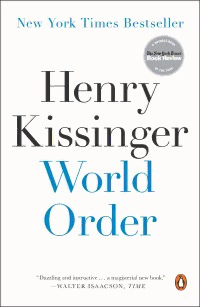
Preview World Order
Cover Page: 1 Praise for WORLD ORDER Page: 2 About the Author Page: 3 Also by Henry Kissinger Page: 4 Title Page Page: 5 Copyright Page: 6 Contents Page: 7 Dedication Page: 8 INTRODUCTION: The Question of World Order Page: 9 Varieties of World Order Page: 9 Legitimacy and Power Page: 11 CHAPTER 1: Europe: The Pluralistic International Order Page: 12 The Uniqueness of the European Order Page: 12 The Thirty Years’ War: What Is Legitimacy? Page: 14 The Peace of Westphalia Page: 16 The Operation of the Westphalian System Page: 17 The French Revolution and Its Aftermath Page: 21 CHAPTER 2: The European Balance-of-Power System and Its End Page: 24 The Russian Enigma Page: 24 The Congress of Vienna Page: 27 The Premises of International Order Page: 29 Metternich and Bismarck Page: 31 The Dilemmas of the Balance of Power Page: 32 Legitimacy and Power Between the World Wars Page: 34 The Postwar European Order Page: 35 The Future of Europe Page: 36 CHAPTER 3: Islamism and the Middle East: A World in Disorder Page: 39 The Islamic World Order Page: 39 The Ottoman Empire: The Sick Man of Europe Page: 42 The Westphalian System and the Islamic World Page: 43 Islamism: The Revolutionary Tide—Two Philosophical Interpretations Page: 45 The Arab Spring and the Syrian Cataclysm Page: 46 The Palestinian Issue and International Order Page: 49 Saudi Arabia Page: 50 The Decline of the State? Page: 53 CHAPTER 4: The United States and Iran: Approaches to Order Page: 55 The Tradition of Iranian Statecraft Page: 55 The Khomeini Revolution Page: 56 Nuclear Proliferation and Iran Page: 58 Vision and Reality Page: 62 CHAPTER 5: The Multiplicity of Asia Page: 63 Asia and Europe: Different Concepts of Balance of Power Page: 63 Japan Page: 65 India Page: 68 What Is an Asian Regional Order? Page: 73 CHAPTER 6: Toward an Asian Order: Confrontation or Partnership? Page: 75 Asia’s International Order and China Page: 75 China and World Order Page: 77 A Longer Perspective Page: 79 CHAPTER 7: “Acting for All Mankind”: The United States and Its Concept of Order Page: 82 America on the World Stage Page: 83 Theodore Roosevelt: America as a World Power Page: 86 Woodrow Wilson: America as the World’s Conscience Page: 89 Franklin Roosevelt and the New World Order Page: 92 CHAPTER 8: The United States: Ambivalent Superpower Page: 95 The Beginning of the Cold War Page: 96 Strategies of a Cold War Order Page: 97 The Korean War Page: 99 Vietnam and the Breakdown of the National Consensus Page: 101 Richard Nixon and International Order Page: 103 The Beginning of Renewal Page: 105 Ronald Reagan and the End of the Cold War Page: 106 The Afghanistan and Iraq Wars Page: 108 The Purpose and the Possible Page: 111 CHAPTER 9: Technology, Equilibrium, and Human Consciousness Page: 112 World Order in the Nuclear Age Page: 112 The Challenge of Nuclear Proliferation Page: 114 Cyber Technology and World Order Page: 115 The Human Factor Page: 117 Foreign Policy in the Digital Era Page: 119 CONCLUSION: World Order in Our Time? Page: 122 The Evolution of International Order Page: 123 Where Do We Go from Here? Page: 125 Acknowledgments Page: 127 Notes Page: 128 Index Page: 144
Description: